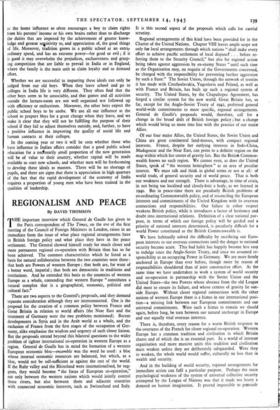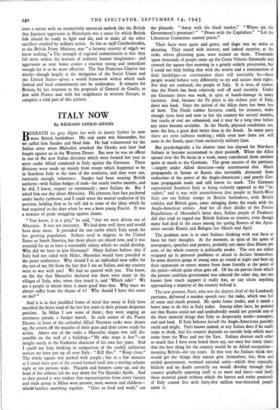REGIONALISM AND PEACE
By DAVID THOMSON
THE important interview which General de Gaulle has given to the Paris correspondent of The Times, on the eve of the first meeting of the Council of Foreign Ministers in London, raises in an immediate form the issue of what place regional arrangements have in British foreign policy and what place they have in the peace settlement. The General showed himself ready for much closer and more permanent regional co-operation with Britain than has so far been achieved. The common characteristics which he listed as a basis for natural collaboration between the two countries were three: that both are Powers of western Europe ; that both are, for want of a better word, imperial ; that both are democratic in traditions and institutions. And he extended this basis to the countries of western Europe as a whole, contending that western Europe "constitutes a natural complex that is a geographical, economic, political and cultural fact."
There are two aspects to the General's proposals, and they demand separate consideration although they are interconnected. One is the proposal for the creation of a common policy between France and Great Britain in relation to world affairs (the Near East and the treatment of Germany were the two problems mentioned). Recent developments in Syria and in the Arab world as a whole, and the exclusion of France from the first stages of the occupation of Ger- many, alike emphasise the wisdom and urgency of such closer liaison. But the proposals extend beyond this bilateral questions to the wider problem of tighter international co-operation in western Europe as a region. General de Gaulle has in mind the formation of a western European economic bloc—ensemble was the word he used: a bloc whose internal economic resources are balanced, but which, as a bloc, would not be self-sufficient as against the rest of the world. If the Ruhr valley and the Rhineland were internationalised, he sug- gests, they would become "the focus of European co-operation," not only between the western nations which would jointly control these rivers, but also between them and adjacent countries with connected economic interests, such as Switzerland and Italy.
It is this second aspect of the proposals which calls for careful scrutiny.
Regional arrangements of this kind have been provided for in the Charter of the United Nations. Chapter VIII leaves ample scope not only for local arrangements through which nations "shall make every effort to achieve pacific settlement of local dispute? . . before re- ferring them to the Security Council," but also for regional action being taken against aggression by ex-enemy States "until such time as the Organisation may, on request of the Governments concerned, be charged with the responsibility for preventing further aggression by such a State." The Soviet Union, through the network of treaties it has made with Czechoslavakia, Yugoslavia and Poland, as well as with France and Britain, has built up such a regional system of security. The United States, by the Chapultepec Agreement, has forged a similar system for the new world. Great Britain has, so far, except for the Anglo-Soviet Treaty of 1942, preferred general world-wide commitments to more specific, regional arrangements. General de Gaulle's proposals would, therefore, call for a change in the broad drift of British foreign policy ; but a change which would bring us more into line with the practice of our major Allies.
Of our four major Allies, the United States, the Soviet Union and China are great continental land-masses, with compact regional interests. France, despite her outlying interests in Indo-China, Madagascar and the Near East, can point to a definite region on the map within which her centre of gravity lies. But the British Common- wealth knows no such region. We cannot even, as does the United States, speak of "the western hemisphere" as an area of peculiar interest. We must talk and think in global terms or not at all : of world trade, of general security and of world peace. That is both our weakness and our strength. There is advantage, in time of crisis, in not being too localised and closely-knit a body, as we learned in 1940. But in peace-time there are peculiarly Br:tish problems of co-ordinating Commonwealth policy, and of reconciling the European interests and commitments of the United Kingdom with its overseas connections and responsibilities. Our failure in either respect weakens British policy, while it introduces a factor of hesitancy and doubt into international relations. Definition of a clear national pur- pose, in terms of which our foreign policy will be guided and a priority of national interests determined, is peculiarly difficult for a world Power constituted as the British Commenwealth is.
We have habitually solved the difficulty by sacrificing our Euro- pean interests to our overseas connections until the danger to national security became acute. This bad habit has happily become less easy to indulge since the Anglo-Soviet Treaty, and since we assumed re- sponsibility as an occupying Power in Germany. We are more firmly anchored in Europe than ever before, though more by reason of responsibilities shouldered than of joint constructive effort. At the same time we have undertaken to work a system of world security and co-operation in partnership with the Soviet Union and the United States—the two Powers whose absence from the old League did most to ensure its failure, and whose centres of gravity lie out-. side Europe. Without closer regional connections with the other nations of western Europe there is a hiatus in our international posi- tion—a missing link between our European commitments and our universal commitments. Were such a hiatus to remain we should again, before long, be torn between our natural anchorage in Europa and our equally vital overseas interests.
There is, therefore, every reason for a warm British response to the overtures of the French for closer regional co-operation. Western Europe has a common tradition and civilisation in which Britain shares and of which she is an essential part. In a world of intenser organisation and more massive units this tradition and civilisation must weaken unless they are deliberately safeguarded. Were they to weaken, the whole world would suffer, culturally no less than in wealth and security.
And in the building of world security, regional arrangements for immediate action can fufil a particular purpose. Perhaps the main psychological weakness of the system of universal collective security attempted by the League of Nations was that it made too heavy a demand on human. imagination. It proved impossible to persuade even a nation with an instinctively universal outlook like the British that Japanese aggression in Manchuria was a cause for which British folk should be ready to fight and die, and to make all the other sacrifices entailed by military action. As late as 1938 Czechoslovakia, to the British Prime Minister, was "a faraway country of wl:}ich we know nothing.". The strength of regional commitments is that they fall more within the horizon of ordinary human imagination: and aggression so near home evokes a reaction strong and immediate enough for it to be more effective. The San Francisco Charter has wisely—though largely at the instigation of the Soviet Union and the United States—given a world framework within which such limited and local commitments can be undertaken. It remains for Britain, by her response to the proposals of General de Gaulle, to join with France and with her neighbours in western Europe, to complete a vital part of this pattern.



























 Previous page
Previous page